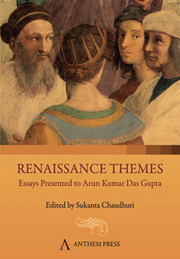Book contents
- Frontmatter
- Contents
- Preface
- List of Contributors
- Arun Kumar Das Gupta
- The Renaissance God as Man of Letters
- Ramist and Senecan Elements in Joseph Hall's The Art of Divine Meditation
- Hypocrite Lecteur: Reading on the Early Modern Stage
- Vertigo
- Folly and Androgyny: Shakespeare's King Lear
- ‘Fatal Visions’ in Macbeth
- The Miltonic Dissimile: Language and Style in Paradise Lost, Book 4
- ‘A Moving Grave’: Positioning Samson Agonistes
- Plate section
The Miltonic Dissimile: Language and Style in Paradise Lost, Book 4
Published online by Cambridge University Press: 05 March 2012
- Frontmatter
- Contents
- Preface
- List of Contributors
- Arun Kumar Das Gupta
- The Renaissance God as Man of Letters
- Ramist and Senecan Elements in Joseph Hall's The Art of Divine Meditation
- Hypocrite Lecteur: Reading on the Early Modern Stage
- Vertigo
- Folly and Androgyny: Shakespeare's King Lear
- ‘Fatal Visions’ in Macbeth
- The Miltonic Dissimile: Language and Style in Paradise Lost, Book 4
- ‘A Moving Grave’: Positioning Samson Agonistes
- Plate section
Summary
The catalogue of gardens that comes after the description of Paradise in Book 4 (ll.268–85) of Paradise Lost has been viewed as something of a rhetorical topos. Alastair Fowler cites a comparable passage from Spenser (The Faerie Queene, II.xii.52). The catalogue may be seen as a special form of what Ernst Curtius described as the topos of outdoing, in which ‘on the basis of a comparison with famous examples provided by tradition, the superiority, even the uniqueness, of the person or thing to be praised is established’. Curtius notes that this rhetorical device was used to suggest the beauty of landscape. Milton's point here is to emphasize the singularity of Eden, and to set it apart from history, myth and legend. As such the catalogue serves a functional end rather than purely a descriptive one. A closer look at its positioning in the narrative is instructive, and a proper view of its place requires us to look back, however briefly, at the description of the garden.
The garden may well be regarded as the most strenuous achievement of Paradise Lost. The inalienable otherness of the garden, its existence outside the known human world, is so critical and difficult to convey because, unlike Hell or Heaven, it is nonetheless a human dwelling-place. It is easier for Milton to convince us of the otherness of hell and heaven than to demonstrate the singularity of the garden, for the garden necessarily involves a human perspective. Its proportions and features are amenable to human sense.
- Type
- Chapter
- Information
- Renaissance ThemesEssays Presented to Arun Kumar Das Gupta, pp. 113 - 126Publisher: Anthem PressPrint publication year: 2009



